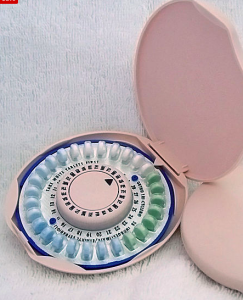
by Amie Newman
Sorry Brett Kavanaugh: Religious Women Use Birth Control

Before the big story of Brett Kavanaugh’s confirmation hearings switched to an alleged attempted sexual assault from his youth, he had already earned women’s groups’ ire: he quoted a right-wing religious talking point, calling birth control “abortion-inducing.”
I’ll share a secret with you: that argument pushed by groups like Priests for Life, the group Kavanaugh quoted during his Supreme Court confirmation hearings last week, has nothing to do with the reality of what religious women do. They use birth control.
Slightly more than eighty-percent of women in the US have a religious affiliation (including Protestant, Catholic, Jewish, Muslim, Buddhist and others). According to the Guttmacher Institute, the overwhelming majority of sexually active women (69 percent) of all religious affiliations, who do not want to become pregnant, are using a highly effective birth control method (this includes the IUD, birth control pill, and sterilization). Sixty-eight percent of Catholic women, those whose religious hierarchy is the most vocally anti-birth control, use birth control.
This means that despite the Catholic Church’s ban on artificial forms of birth control, and their science-controverting attempt to paint certain types of contraception including emergency contraception as “abortion-inducing” (which is not supported by actual science) and therefore unacceptable, religious women still understand‑—and—embrace what they need to maintain control over their reproductive lives. Contraceptive use by Catholics and Evangelicals, including those who frequently attend religious services, “is the widespread norm, not the exception,” notes the Guttmacher Institute.
Why does this matter? Because this is part of a pattern of male religious leaders drowning out the voices and experiences of religious women. “Religious liberty” laws target women’s reproductive health and rights regularly—and we know that Roe v. Wade is clearly in the crosshairs right now. These laws claiming “liberty” may even discriminate against Jewish women of all denominations who use birth control. Dr. Bat Sheva Marcus, an Orthodox sex therapist who works with Jewish women across the religious spectrum, told New York Jewish Week, “…most Modern Orthodox women use birth control.” Jewish law takes a nuanced look at a woman’s use of birth control allowing it when a woman’s life is in danger and—in fact—encouraging its use within certain circumstances, particularly when used as a health remedy.
Yet over the last several years, anti-choice advocates often spearheaded by religious leaders including the U.S. Conference of Catholic Bishops, have attempted to use religion to control access to reproductive health care, with varying degrees of success. From the “personhood” movement which fights for laws that define life as beginning at conception to the “Hobby Lobby” Supreme Court case ruling that particular for-profit groups could use a religious exemption to opt-out of the Affordable Care Act’s (ACA) mandate that all employer insurance plans must cover birth control, religious women’s health and lives are under attack.
Yet despite all the noise from these “official channels” birth control is not debatable for most religious women. Religious women do what they need to control their fertility, even as they may struggle privately with the chasm between what they need and know to be right and what their religious hierarchy espouses to be “moral.”.The public disagreement over our bodies and what women should and shouldn’t be allowed to legally and safely do to manage them stems wholly from a patriarchal system that holds the power to create controversy and manufacture shame.
Kavanaugh and Priests for Life don’t just stir up controversy over women’s bodies and lives in order to sustain the push for limiting access to birth control and safe abortion. They reframe religious women’s thoughts and experiences with birth control for their own political gain. Religious women obviously understand the difference between abortion and birth control, despite the male-led religious groups insistence on blurring the lines between the two.
So, where are the voices of religious women opposing these groups and sharing their own truths of their reproductive decisions? In 2014, Elizabeth Patton, an OB/GYN and researcher at the University of Michigan, along with some of her colleagues, asked a similar question. They decided to conduct the first study to look specifically at the views of religiously affiliated women aged 18 to 55—those who are most affected by access to birth control—on the ACA’s contraception mandate.
What they found was fascinating. It was Catholic women—those women who were most singled out in the debate over the contraceptive coverage policy—who most supported it. According to The Atlantic,
Sixty-three percent of Catholic women said that employers should provide no-cost contraception for employees, making them second only to mainline Protestant women, at 66 percent, in their support. Both groups supported the mandate at greater rates than the general population—… “Catholics are often portrayed as the group that is opposed to the mandate, but these women had some of the highest rates of support,” Patton noted. “This shows that the narrative that we hear isn’t reflecting what women are thinking.”
Does Brett Kavanaugh fall in lockstep with religious leaders like the US Conference of Catholic Bishops and Priests for Life? He supported the argument that the ACA’s contraceptive mandate was an “undue burden” on religious groups and he ruled against a young immigrant woman’s right to access a safe abortion.
He may become one of the most powerful judges in this country and it’s terrifying to consider that he could support religious leaders as they continue to ignore the women who make up their congregations, sacrificing their reproductive health and lives on the altar of power.